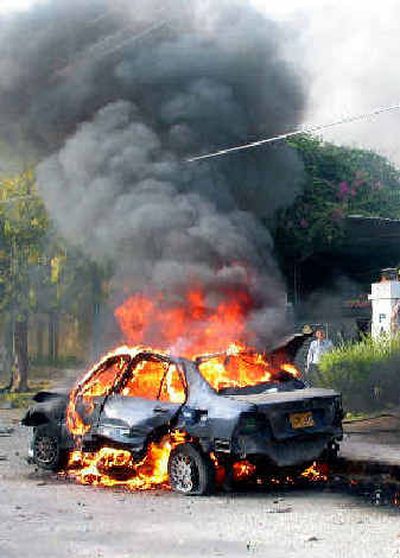Karachi bombs kill one, hurt 34

KARACHI, Pakistan – Two car bombs exploded Wednesday near the home of an American diplomat and an English-language school, killing a police officer and wounding 34 people, mostly police and journalists, police officials and doctors said.
The two bombs detonated about a half-hour apart in a heavily guarded neighborhood where the residence of the U.S. consul general and the Pakistani-American Cultural Center, a private school that is not affiliated with the U.S. government, are located.
Tariq Jamil, the head of police operations in Karachi, called the attack “the work of highly trained terrorists.”
The bombings occurred one block from the U.S. Consulate, which has been the target of at least three attacks in two years, including a suicide bombing in June 2002 that killed 15 people. Since that attack, the consulate has not been open for normal business and has been run by a skeleton staff.
Police said that the man believed to have organized the consulate bombing, identified as Kamran, was among at least eight Islamic militants arrested over the weekend in connection with a failed plot to kill Pakistan’s president, Gen. Pervez Musharraf, in April 2002. Senior police officials suggested Wednesday’s attack might have been carried out by other Islamic guerrillas in retaliation for the arrests.
“Kamran, alias Atif, was the kingpin of terrorists who had sent suicide bombers to the U.S. Consulate in 2002,” said Syed Kamal Shah, the chief of police in Sindh province. “We knew there will be a desperate response to his arrest.”
Police said the first bomb was apparently intended to attract a crowd and that the second, more powerful device inflicted most of the casualties.
The second explosion occurred just as a local television news crew was filming the car and describing it as an abandoned vehicle. Television images showed the explosion, followed by bleeding police officers and journalists emerging from behind thick smoke and debris.
“Luckily many lives were saved because the injured people were quickly brought to the hospital by the ambulances which were already on the scene,” said Hamid Jamali, a physician at Jinnah Hospital, where most wounded were taken.
Jamil, the head of police operations, said the first bomb apparently was planted in the parked car of a local man who was visiting the school. “The higher-intensity bomb targeted against the police and journalist crowd was concealed in a car snatched only 90 minutes before the incident,” Jamil said.
Karachi, Pakistan’s largest city, has been the scene of frequent violence, including several recent attacks on American and other Western targets. In addition to the 2002 consulate bombing, a massive car bomb killed 11 French engineers in May 2002, and Wall Street Journal reporter Daniel Pearl was kidnapped and killed here the same year.